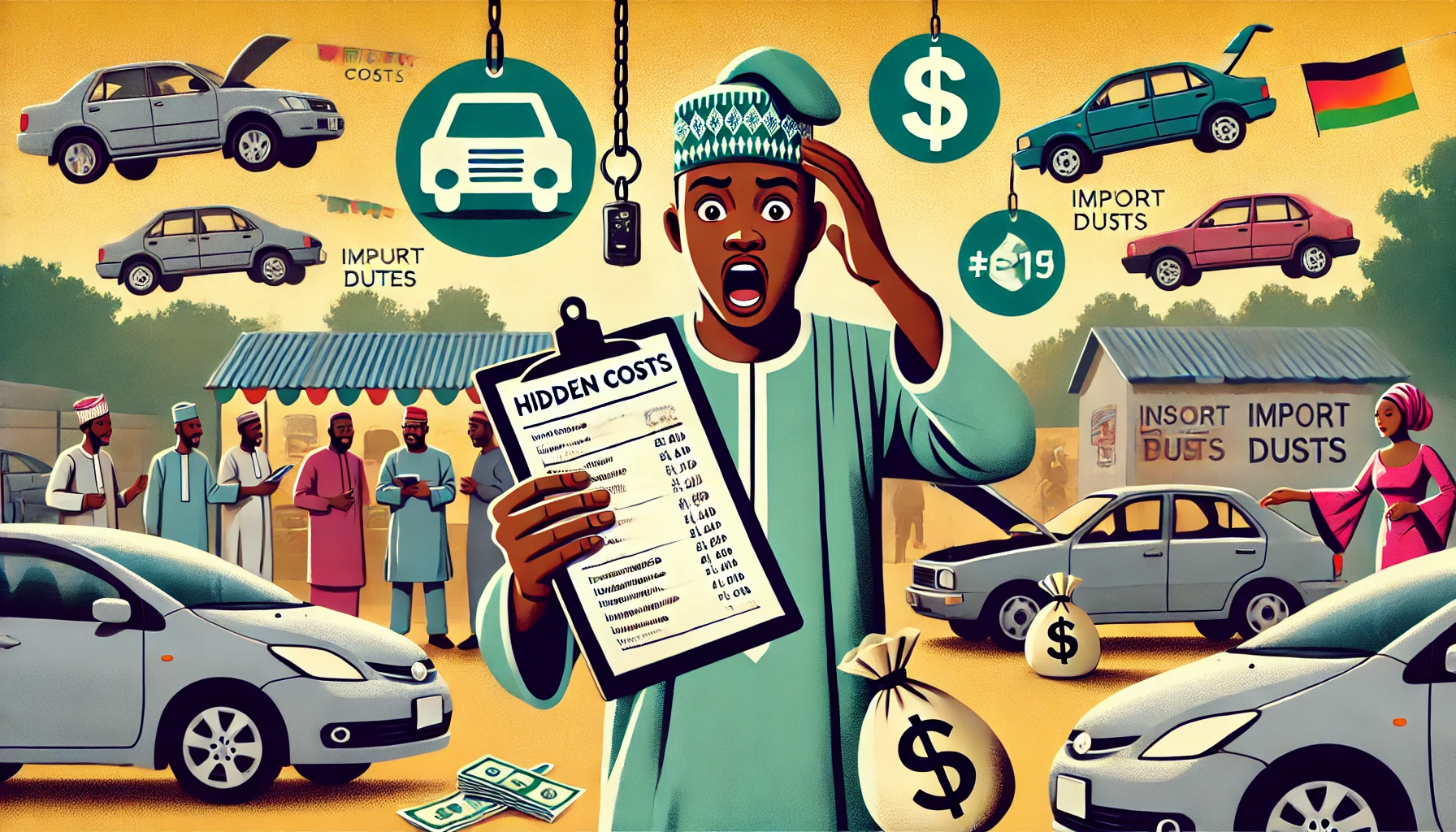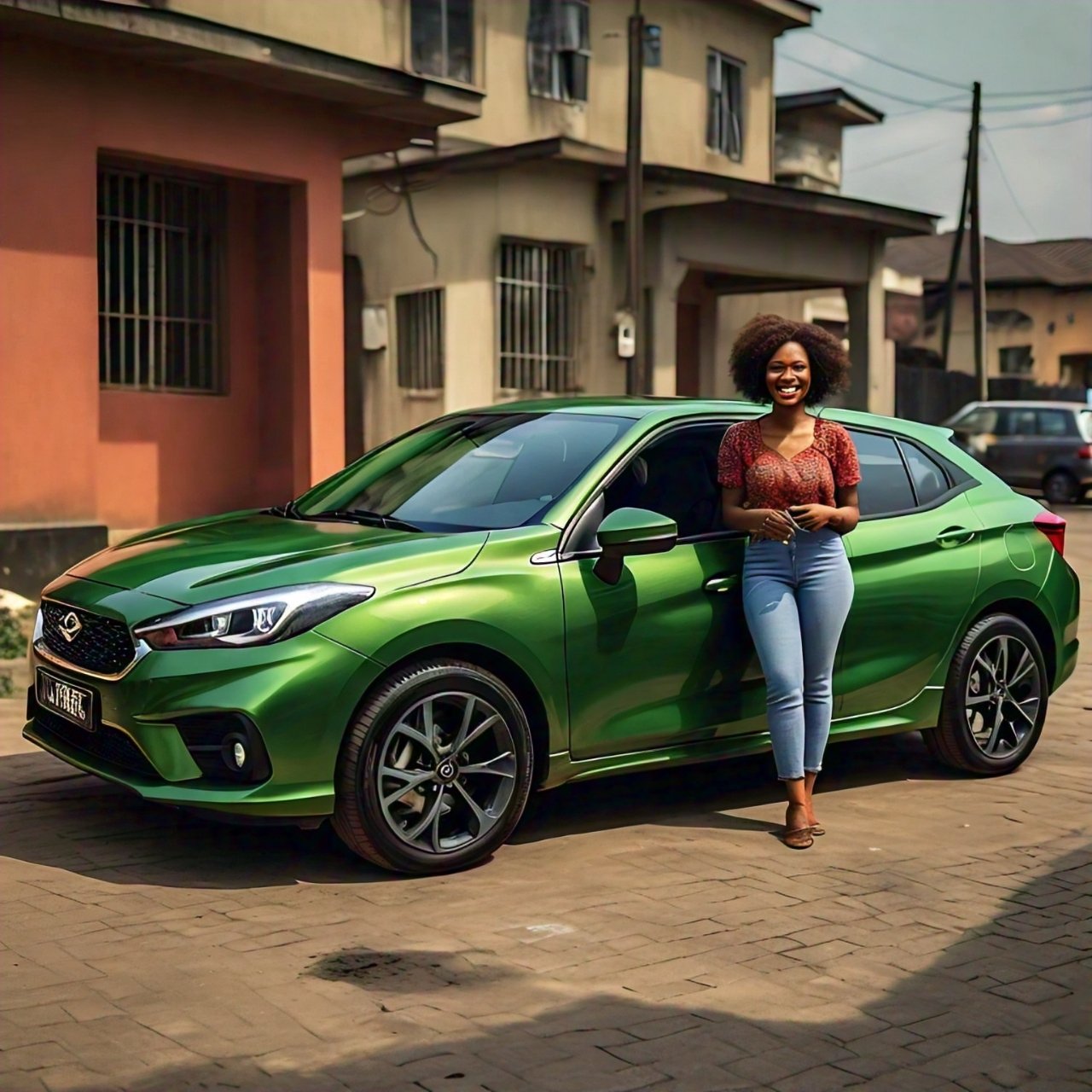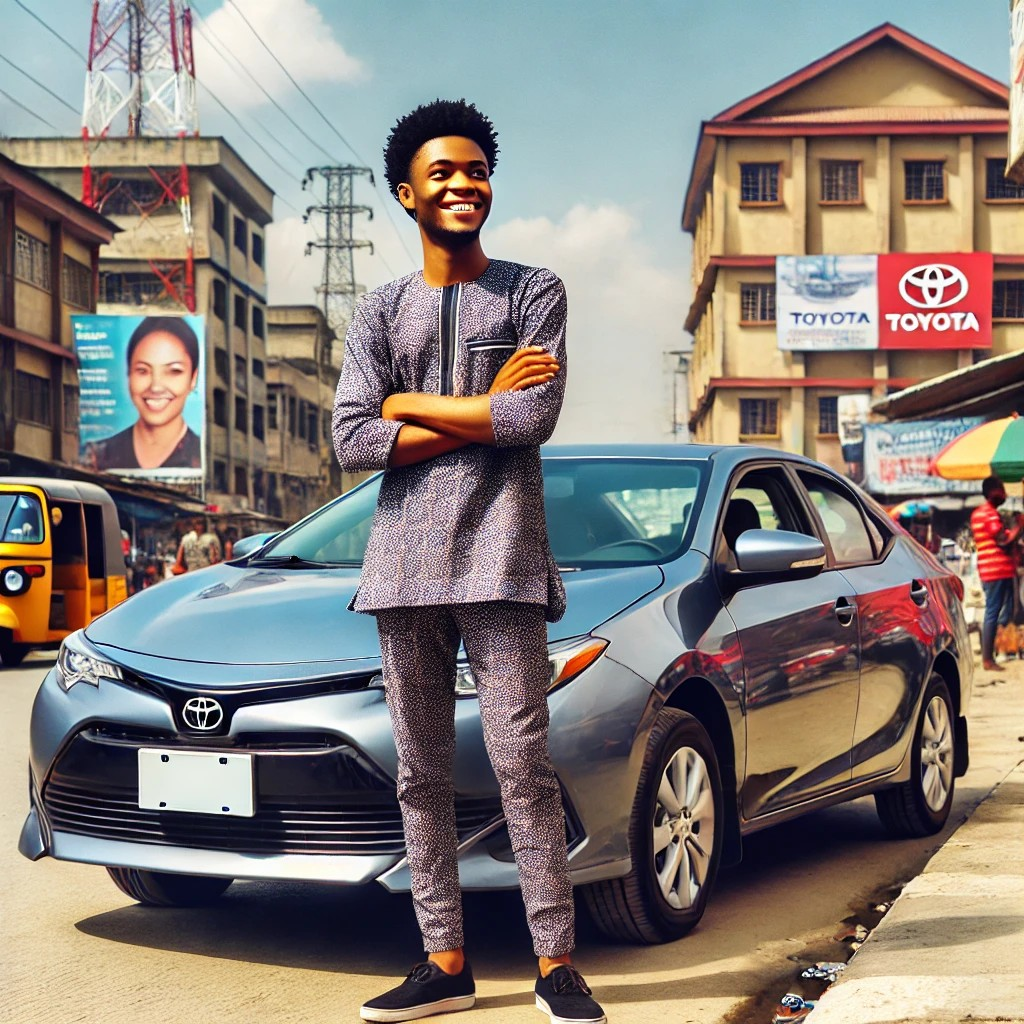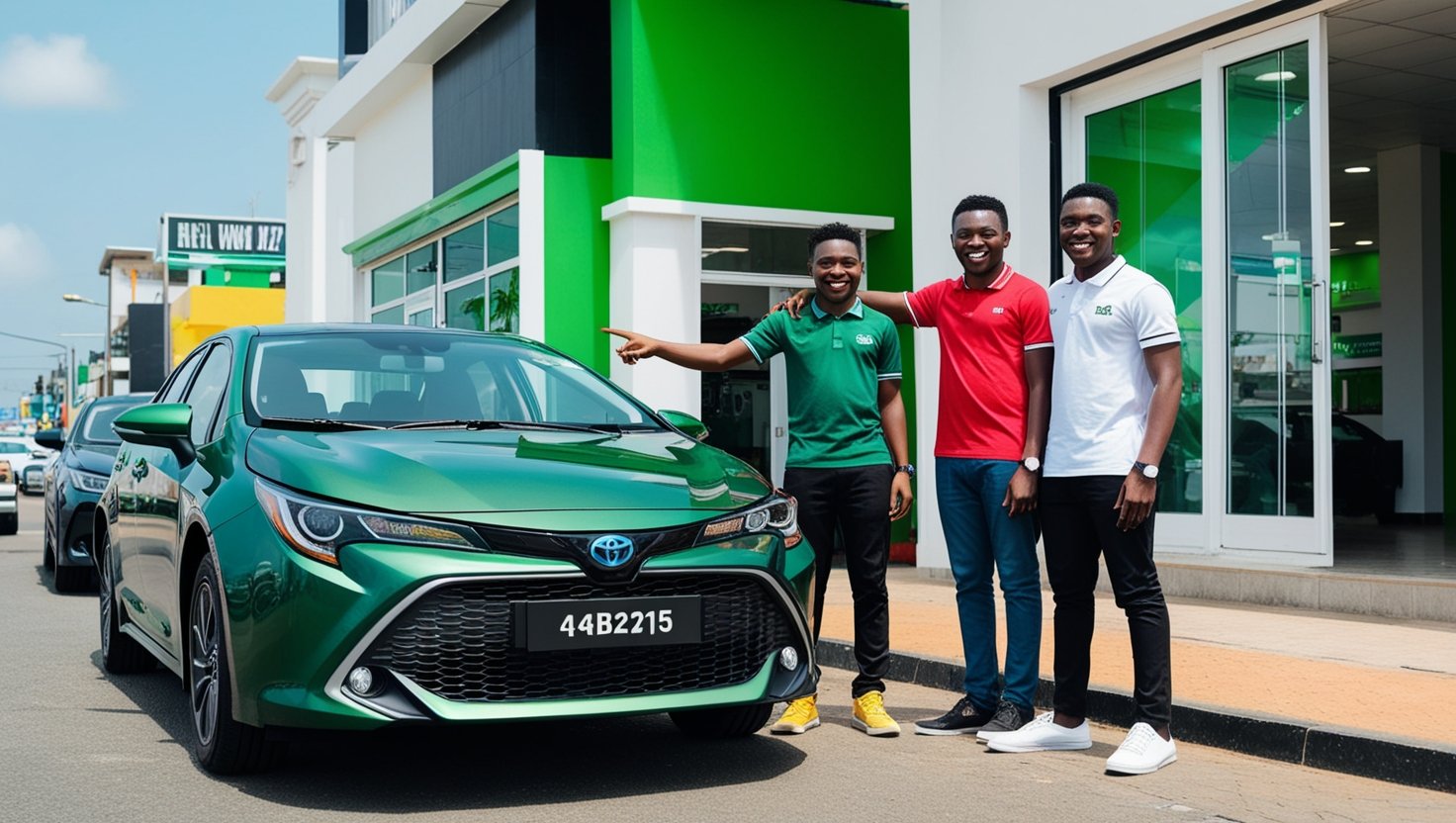Buying your first car in Nigeria can be an exciting experience, but many first-time buyers often focus solely on the purchase price and overlook the hidden costs that come with owning a car.
From import duties for Tokunbo cars to recurring insurance and maintenance expenses, understanding these hidden costs will help you plan better and avoid unexpected financial strain.
This guide will highlight the key hidden costs to consider when buying your first car in Nigeria.
Before we dive in, our guide on A Comprehensive Guide to Buying Your First Car in Nigeria (2025) lay a strong foundation if you are considering of buying your first car in Nigeria.
Nigeria Import Duties and Shipping Costs
Import Duties on Tokunbo Cars
When buying a used (Tokunbo) car in Nigeria, the import duties and tariffs can significantly add to your costs. Nigeria imposes customs duties on imported vehicles, which are primarily determined by the car’s age, engine capacity, and country of origin.
Generally, the older the vehicle, the higher the duty, as these older models often have higher emissions or outdated features. This means a 10-year-old vehicle may cost you substantially more in import fees than a car only a few years old.
Also, larger engines (typically above 2.0 liters) often face higher duties due to their fuel consumption and environmental impact.
For first-time buyers, it’s essential to know these costs ahead of time to avoid unexpected financial strain. Import duties are usually calculated as a percentage of the car’s market value, along with surcharges on older vehicles and certain engine types.
You can look up Nigeria’s most recent customs duty percentages online, or work with a customs agent who knows the ins and outs of these charges. This can help you get a rough estimate and prevent surprises when it’s time to clear your car at the port.
Customs agents are invaluable, especially for first-time buyers, as they can often calculate these costs based on the car’s details and guide you through the payment process.
Shipping and Clearing Fees
Shipping and clearing fees are also essential considerations. After purchasing a car abroad, you’ll likely face substantial shipping costs that vary based on the distance and mode of transport.
Shipping fees are typically calculated based on the size and weight of the car and can vary by port, shipping company, and time of year.
Cars coming from Europe, for instance, might cost less to ship than vehicles from North America due to shorter transit routes. However, these costs add up and can sometimes be up to 20% of the car’s total purchase price.
Once your car arrives in Nigeria, clearing fees at the ports are another unavoidable expense. Lagos and Port Harcourt are the most commonly used ports, each with their own clearing protocols and costs.
Clearing a car can sometimes be a lengthy process, as it involves documentation and fee payments at various stages. Hiring a clearing agent with knowledge of the Nigerian customs process can save you time and help you avoid any hiccups.
Clearing agents are skilled in managing the paperwork and navigating the port authorities, and while their service is an added cost, it’s often worth it for the smoother, quicker process.
For more information, check out our guide on Should First-Time Buyers in Nigeria Choose New or Tokunbo Cars?
Registration and Licensing Fees
First-Time Registration Costs
When buying your first car in Nigeria, the initial registration is a necessary expense that ensures your vehicle is legally recognized on Nigerian roads. This process includes a fee that varies depending on whether your car is new or a Tokunbo (imported used car).
For brand-new vehicles, registration might be simpler and slightly more streamlined, while Tokunbo cars often involve additional verification steps to comply with Nigerian standards.
Expect registration costs to depend on your car’s engine capacity, model year, and other factors—typically, the larger and newer the vehicle, the higher the fee.
The registration process includes getting a Vehicle Identification Number (VIN), completing necessary paperwork, and paying for vehicle registration plates.
In some cases, particularly for Tokunbo cars, additional checks might be required to ensure the car meets local road safety standards.
Typically, you’ll need documents like your proof of purchase, customs duty receipts, and your identification.
It’s worth visiting a reputable Vehicle Inspection Office (VIO) or Federal Road Safety Commission (FRSC) office for accurate information on required documents and fees.
While it may take a bit of time, completing registration promptly helps you avoid fines and ensures you’re driving legally.
Roadworthiness and Licensing Fees
Once registered, you’ll also need a roadworthiness test, especially if your car is a Tokunbo. This test ensures that your vehicle is fit for the road and complies with safety standards—covering things like the functionality of your brakes, lights, and emissions levels.
Fees for roadworthiness tests vary by location and sometimes by vehicle type, but they’re generally a small percentage of the total costs of car ownership.
However, first-time car owners should budget for this to avoid surprises. Many buyers overlook these costs, only to realize later that they’re required to legally drive in Nigeria.
Annual licensing fees, which differ slightly by region and vehicle type, are another ongoing expense. This licensing essentially validates that your car is compliant and legally authorized for the roads each year. Failing to pay these fees can lead to penalties or even vehicle impoundment.
To get the latest information on these fees, consider consulting with the Federal Road Safety Corps (FRSC) or visiting local Vehicle Inspection Offices. It’s an annual cost but one that’s necessary to maintain your driving privileges in Nigeria.
Car Insurance Costs
Types of Car Insurance in Nigeria
Navigating car insurance as a first-time car buyer in Nigeria can feel like a lot, but breaking down the basics can help. At its core, there are two main types of car insurance available in Nigeria: third-party insurance and comprehensive insurance.
Third-party insurance is the minimum required by law for all drivers. It covers damages or injuries you might cause to others (the “third party”) but doesn’t cover damage to your own car or injuries.
This option is generally the most affordable, with an average cost around ₦10,000–₦20,000 per year depending on your provider and location. However, while this meets legal requirements, it leaves you on the hook for repairs to your own vehicle after an accident.
On the other hand, comprehensive insurance provides much broader protection. In addition to covering third-party liabilities, comprehensive policies also cover theft, fire damage, and even certain repairs to your own vehicle. This can be especially valuable if you’ve invested a significant amount in your first car.
While comprehensive insurance is more expensive—generally ranging from 3–5% of your car’s value per year—it can give you peace of mind, especially as a new driver. This is particularly helpful in Nigeria, where unexpected repairs and theft risks can be a financial burden.
As a first-time buyer, it may seem tempting to choose the cheaper third-party option, but comprehensive coverage is worth considering if you have the budget.
After all, the added protection can save you money in the long run, especially if your vehicle is newer or more valuable.
Factors Affecting Insurance Costs
Several factors impact how much you’ll pay for car insurance in Nigeria, and being aware of them can help you find a policy that fits your budget.
First, the make and model of your car plays a big role—premium vehicles or models with high repair costs tend to have higher insurance premiums.
If you’re buying a popular model, such as a Toyota Corolla or Honda Civic, you may find slightly lower rates, as these cars are typically easier to repair and maintain.
The age and condition of the car also make a difference. Newer cars or well-maintained models typically carry higher premiums, as they’re more expensive to repair or replace.
However, if you’re buying a used car (Tokunbo), you might qualify for lower rates on comprehensive coverage, although this depends on your insurer.
To get the best deal on car insurance, try shopping around for quotes from multiple providers.
Many Nigerian banks and insurance companies, like Leadway Assurance and AXA Mansard, offer car insurance tailored for first-time buyers.
Additionally, keep an eye out for potential discounts—some insurers offer lower rates if you install an anti-theft device or drive a lower mileage each year.
Asking about these small savings opportunities can reduce your overall premium and help you stick to your budget.
Maintenance and Repair Costs
Regular Maintenance
When budgeting for a car, it’s essential to consider the costs of regular maintenance, which keep your vehicle running smoothly and prevent major issues down the road.
For commonly owned models in Nigeria like Toyota and Honda, typical maintenance includes oil changes, brake pad replacements, and tire rotations.
- Oil Changes: Oil changes are recommended every 5,000–10,000 kilometers, depending on the oil type. This usually costs around ₦10,000–₦25,000 for basic oil and filter changes. Using synthetic oil, while pricier (₦20,000–₦60,000), can extend the interval between changes, potentially saving costs over time.
- Brake Pads: Brake pads wear down with use, so changing them every 20,000–30,000 kilometers is common. On average, this costs between ₦10,000–₦45,000, depending on the car model and brake pad quality. Affordable brands are available, but investing in quality pads can extend their life, reducing frequency and long-term costs.
- Tires: Tire lifespan varies but typically lasts around 40,000 kilometers. Replacing a single tire for popular models like Toyota Corolla or Honda Civic generally costs around ₦25,000–₦60,000. It’s wise to check tires regularly for wear and alignment to maximize their lifespan.
- Other Regular Maintenance: Regular checkups and part replacements—like filters, fluids, and battery checks—also add to costs, averaging ₦30,000–₦70,000 annually.
By budgeting for these periodic expenses, first-time buyers can ensure they don’t encounter unexpected interruptions due to neglected maintenance.
Unexpected Repairs
Even with routine maintenance, unexpected repairs can arise, especially with Tokunbo (imported used) cars that may have a less certain service history. Common issues with used cars in Nigeria can include transmission problems, suspension wear, and electrical faults. Here’s a quick overview:
- Transmission Repairs: Transmission issues can be costly, with repairs ranging from ₦50,000 to ₦500,000 depending on severity. While not common, this can be a significant cost for older vehicles.
- Suspension Repairs: Nigerian roads can be rough on a car’s suspension, with repairs costing around ₦20,000–₦200,000. Suspension issues are common, especially for Tokunbo cars, and ignoring them can lead to further damage and higher costs.
- Electrical Repairs: Electrical systems can be unpredictable, especially in Tokunbo cars, with repairs costing around ₦10,000–₦50,000, depending on the issue.
Creating a reserve fund of at least ₦50,000–₦100,000 specifically for unexpected repairs can help cover these costs. This helps avoid strain on your budget and ensures you’re prepared for any surprises.
A reserve fund not only covers repairs but also offers peace of mind, allowing you to keep your car in safe working condition without delay.
Please note that there are “Key Mistakes to Avoid When Budgeting for Your First Car”. So, check it out.
Fuel Costs
Estimating Fuel Consumption
Understanding fuel consumption is key to managing ongoing expenses for car ownership, as fuel is often a major monthly cost. Fuel efficiency varies significantly across car types, impacting how much you spend on fuel each month.
- Fuel Efficiency Basics: Fuel efficiency is typically measured in kilometers per liter (km/L), indicating how far a car can travel on one liter of fuel. Generally, smaller, lighter cars (like sedans or compact vehicles) consume less fuel, with typical fuel economies of 12–15 km/L. Larger vehicles like SUVs often have lower fuel efficiency, closer to 8–10 km/L.
- Average Fuel Costs: With petrol prices in Nigeria fluctuating, it’s crucial to calculate potential monthly expenses based on your vehicle’s fuel efficiency. For instance:
- If petrol costs around ₦1,000 per liter, a car with a fuel economy of 12 km/L would require about ₦8,333 for every 100 km of driving.Diesel cars, while generally more fuel-efficient and with a higher km/L rating, often have higher per-liter costs.
- Petrol vs. Diesel: Diesel engines tend to have a higher fuel economy, meaning they consume less fuel for the same distance. However, diesel vehicles may come with higher purchase and maintenance costs, so it’s worth comparing these factors based on your driving habits.
Being aware of your expected mileage and your car’s fuel efficiency can help set realistic expectations for your monthly budget.
Daily and Long-Distance Driving Considerations
Your daily commute, driving patterns, and preferred car type play an important role in fuel costs.
- Daily Commute Fuel Costs: Calculate your daily mileage to estimate monthly fuel expenses. For example, if you drive 50 km daily with a car that has a fuel efficiency of 12 km/L, you will need roughly 125 liters of fuel monthly (weekends inclusive), costing approximately ₦125,000 at current prices.
- Long-Distance Travel: For those who frequently travel between cities, it’s crucial to account for higher fuel consumption, particularly with larger cars like SUVs. Long-distance driving is often more fuel-efficient (due to steady speeds) but can increase overall fuel usage significantly.
- Car Types and Fuel Efficiency: Different car types have varying fuel needs:
- Sedans and Compact Cars: These typically offer the best fuel efficiency, making them ideal for city commutes and shorter distances.SUVs and Trucks: While these offer more space and power, they often consume more fuel due to larger engines and heavier frames, especially during city driving.
Knowing the distinctions in fuel consumption can help you select a vehicle that best fits your lifestyle and budget.
Our guide on “Calculating Ongoing Costs of Owning a Car” will aid your understanding on how fuel expenses factor into overall ownership costs.
Emission and Pollution Fees
Emission Testing for Tokunbo Cars
In Nigeria, emission testing requirements apply to certain vehicles, particularly Tokunbo (used imported) cars, to reduce pollution and ensure compliance with environmental standards.
- Emission Testing Overview: For Tokunbo vehicles, emission tests check for pollutants such as carbon monoxide (CO) and hydrocarbons (HC) in exhaust gases. These tests aim to ensure that the vehicles on Nigerian roads meet air quality standards to help combat pollution in urban areas.
- Testing Costs and Requirements: Emission tests often involve fees, and costs can vary by location and vehicle type. If a vehicle fails the emissions test, the owner may incur additional repair expenses to bring the vehicle up to compliance. These costs are especially relevant for Tokunbo cars, as older models may be more prone to emissions issues.
- Potential Repair Costs: For Tokunbo cars that do not meet emissions standards, common repairs include adjustments to the exhaust system, replacing air filters, or installing catalytic converters. These repairs are necessary for passing retests and for the vehicle to remain legally operational.
Pollution Tax (if applicable)
Pollution-related fees, also known as pollution taxes or environmental levies, are sometimes imposed on high-emission vehicles. These fees aim to reduce the number of high-polluting vehicles on the road and encourage environmentally friendly practices.
- Pollution Tax Overview: In some countries, high-emission vehicles are subject to pollution taxes, but such fees may vary in their application across Nigeria. Although not uniformly enforced, a pollution tax could be introduced as part of broader efforts to reduce carbon emissions.
- Future Considerations: For buyers of high-emission vehicles or older Tokunbo models, there is a potential risk that pollution taxes or related fees could become more common. This would mean additional costs, particularly for cars that produce above-average emissions.
Depreciation
How Depreciation Affects Tokunbo Cars
Tokunbo (used imported) cars often experience accelerated depreciation, primarily due to their age, wear, and import status. Here’s how depreciation affects Tokunbo vehicles and some strategies to manage its impact:
- Higher Depreciation Rates: Tokunbo cars are generally older and have more mileage, making them depreciate faster than new cars. This rapid depreciation can significantly reduce resale value, particularly within the first few years of ownership. Imported cars may also face additional depreciation in Nigeria due to environmental factors, road conditions, and limited access to spare parts.
- Impact on Resale Value: Because Tokunbo cars have already depreciated in their country of origin, their resale value in Nigeria tends to be lower. This reduced resale value means first-time buyers might need to factor in a higher potential loss if they plan to sell the car within a few years.
- Tips for Minimizing Depreciation:
- Choose Durable Models: Some brands, like Toyota and Honda, hold their value better due to reliability, making them a wise choice for minimizing depreciation.Proper Maintenance: Regular maintenance and timely repairs can help preserve the car’s value.Buy Newer Used Models: Newer Tokunbo models with fewer miles tend to depreciate more slowly, helping you retain value over time.
Depreciation of New Cars
New cars experience the highest rate of depreciation as soon as they are driven off the lot, which can impact long-term ownership costs.
- Initial Depreciation: The value of a new car typically drops by around 20-30% within the first year, largely due to immediate depreciation after purchase. This rapid initial decline can result in higher long-term costs, as the resale value diminishes quickly.
- Long-Term Depreciation: Although depreciation slows after the first few years, a new car’s value will continue to decline annually. Buyers should consider how this loss affects the overall cost of ownership, especially if they plan to sell or trade the vehicle within a few years.
- Tips to Offset Depreciation:
- Consider Low-Mileage Models: Buying a gently used model can provide the benefits of a new car with a lower depreciation rate.Buy Models with Strong Resale Value: Certain brands and models depreciate more slowly due to factors like reliability and popularity, making them a more cost-effective choice.
Conclusion
While buying your first car in Nigeria can be exciting, it’s crucial to prepare for the hidden costs that can arise during ownership.
Import duties, registration fees, insurance premiums, and ongoing maintenance are just some of the expenses you’ll need to account for.
By understanding and budgeting for these hidden costs, you’ll be better equipped to handle the financial responsibilities of owning your first car without surprises.




